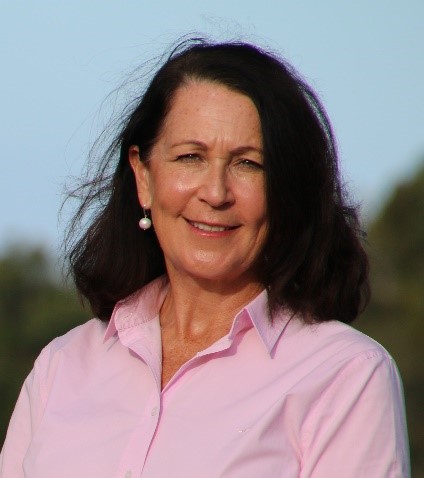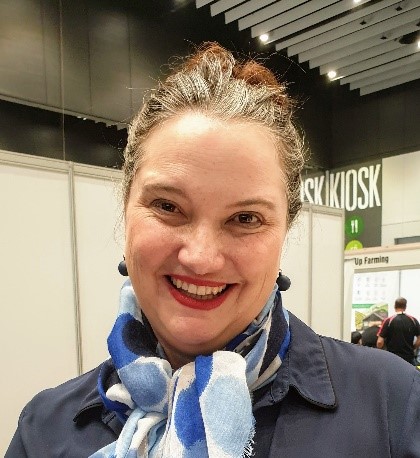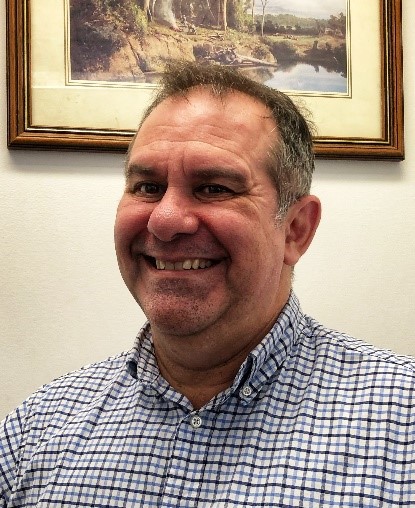Workplace health management plans: COVID-safe farms
Welcome to Turf ‘n’ Surf, a podcast that tells stories in Queensland’s farming, fishing, biosecurity and forestry sectors.
The COVID-19 pandemic has reshaped society and agribusiness is no exception.
With travel restrictions and health protocols, how do you ensure that there are enough seasonal workers to work on farms and that the risk of spreading COVID-19 is all but eliminated?
This episode of Turf ‘n’ Surf looks at why all Queensland agribusinesses, commercial fishing businesses and agriculture labour hire companies that employ seasonal workers need a workplace health management plan and what happens when a seasonal worker tests positive to COVID-19.
You’ll hear from Rachel Mackenzie, Executive Director of Berries Australia – the peak body for Australian berry growers; Paul Walmsley, General Manager, Rural Economic Development, for Queensland’s Department of Agriculture and Fisheries; Salvo Vitelli, Acting General Manager, Agriculture Policy, for Queensland’s Department of Agriculture and Fisheries; and Fiona O’Sullivan, Operations Manager for Queensland’s Office of Industrial Relations’ Workplace Health and Safety Queensland Agriculture Unit.
Find out how workplace health management plans are helping to ensure that fresh food continues to get from the paddock to the plate.
Meet our guests
Transcript
Program intro: Welcome to Turf and Surf, powered by Queensland’s Department of Agriculture and Fisheries, shaping and protecting food and fibre for tomorrow’s Queensland.
Host: Seasonal workers including backpackers, non-permanent residents and temporary visa holders are an essential part of Queensland’s agribusiness and fisheries industries helping to make sure the delicious, fresh food finds its way to shops and, ultimately, into our homes.
The seasonal workers cohort comprises both Australians and people from overseas who come to travel and work temporarily in Australia. In fact, the working holiday, funded by such work, is something of a rite of passage for many people.
However, the coronavirus pandemic has re-shaped society and agribusiness is no exception. Among the myriad of problems posed by COVID-19 is being able to ensure there are enough seasonal workers and that the workplace and community are protected from the transmission of COVID-19.
On June 1st 2020, a seasonal worker entered Queensland as an exempt seasonal worker from Melbourne and spent time in Brisbane before flying to Bundaberg the following day.
However, the man was infectious with COVID-19 when he flew to Bundaberg from Brisbane for a fruit picking job. Contact tracing resulted in testing for COVID-19 including co-workers in Bundaberg with all tests fortunately returning negative results.
So even with travel restrictions and health protocols, how do you ensure that there are enough seasonal workers and that the risk of spreading COVID-19 is all but eliminated.
I’m Brad Muir. In this episode of Turf and Surf we’ll look at why all Queensland agribusinesses, commercial fishing businesses and agriculture labour hire companies that employ seasonal workers need a workplace health management plan, what happens when a seasonal worker tests positive to COVID-19 and the measures the Queensland Government has taken to ensure that food continues to get from the paddock to the plate.
Program segue: You’re listening to Turf and Surf, the official podcast of Queensland’s Department of Agriculture and Fisheries. Shaping and protecting food and fibre for tomorrow’s Queensland.
Host: Rachel Mackenzie is the Executive Director of Berries Australia, the peak body for Australian berry growers. Rachel has been involved in agribusiness for 14 years including 12 years as Chief Advocate for Queensland’s peak horticulture body, Growcom, and knows what’s required for a successful horticulture industry.
Thanks for joining us Rachel. What I’d like to know first is why are seasonal workers such a vital part of agribusiness?
Rachel Mackenzie: Well horticulture in particular has very significant worker requirements at certain times of the year because of the nature of our crops.
So, as we all know, fruit and vegetables are very seasonal and at certain times of the year we need hundreds and hundreds of workers on individual farms to come in and pick and pack those crops.
And some of these farms, under normal circumstances, may actually only be an owner operator and an offsider. So, these seasonal workers, who are generally employed for a short amount of time on a casual basis, are the lifeblood of our sector.
Host: Rachel, could you give us a sense of what sort of work that seasonal workers actually do?
Rachel Mackenzie: There is an incredible diversity in terms of the work that seasonal workers do but I think it’s all characterised by being fairly intense manual kind of labour.
So, often it involves getting up very early in the morning, it often involves working in non-urban areas. When the crop is on you need to be able to pick seven days a week, seven hours a day, eight hours a day until the crop is done.
So, it very much is an intense period of work over a short amount of time rather than the normal nine to five that most of us understand with a weekend because a berry doesn’t know when it ripens whether it’s Saturday or Sunday, it just is ripe and we need to get it to market as quickly as possible.
So, the working conditions can be quite strenuous but we do get reports from backpackers who say it was the best time of their lives as well.
Host: And what would happen if seasonal workers weren’t available to agribusiness?
Rachel Mackenzie: Agribusiness is very, well horticulture in particular, is extremely reliant on seasonal workers.
They are absolutely critical for the success of our industry. Many people wouldn't realise that up to 60 percent of a business’s input costs are actually workforce related and these tend to be the seasonal workers.
So, if we can’t access the workers that we need at the time that we need them then we are unable to pick the crops in a timely fashion and the number of commodities, berries in particular because it’s very time critical and highly perishable, would just not be available to the consumer if we did not have access to the seasonal workers.
Host: In Bundaberg we had a case where a seasonal worker tested positive to COVID-19. From an industry perspective what were the key learnings from that case?
Rachel Mackenzie: Having a worker test positive for COVID-19 was one of our great fears because obviously businesses are concerned about major business disruption.
There was also concerns about implications across the whole sector in terms of how people were accommodated and how quickly infections could rage through the seasonal worker community. But I think that the mechanisms put in place by the Queensland Government, which were then implemented very effectively by the grower in that location, meant that what could have been an absolute disaster, not only for that business but for that whole region, were able to be contained.
So the grower had in place their health plan, they had kept their workers separated, they’ve managed them in teams, they actually managed their own accommodation. So, again, they were able to identify who that worker had been living with.
They had all of their worker disclosure forms up to date and they had in place good practices and protocols. So, fortunately that case was a one off and the grower, when they were obviously assessed by Government, was found to have done everything right.
And I think if we had a situation where the grower had not had all of those things in place, they didn’t know where their worker was staying, they didn’t know who they were socialising with, they couldn't demonstrate that they’d met all of their obligations then we would have had a really different outcome.
So, a big tick for the growers themselves and a big tick for the Queensland Government for putting in place the requirements that enabled us to minimise the impact on business and the wider growing community.
Host: Some really good points there Rachel and with no immediate end in sight to the COVID-19 pandemic, what’s your advice to producers about safely managing their farms?
Rachel Mackenzie: Top of the list is know your obligations. The Queensland Government has done an enormous amount of work on this and you can contact your local DAF officer.
Also paperwork, paperwork, paperwork. We all hate it but in this instance it’s just so important to keep on top of all those paperwork obligations. In the case that we had, I think that is a big part of what saved that grower from major business disruption.
Program segue: This Turf and Surf podcast is powered by Queensland’s Department of Agriculture and Fisheries, shaping and protecting food and fibre for tomorrow’s Queensland.
Host: On this episode of Turf and Surf, we’re looking at safe farming practices during the COVID-19 pandemic and what the Queensland Government is doing to ensure that fresh delicious food continues to get from the paddock to the plate.
On May 5th 2020, the Queensland Government introduced a raft of measures so the growers could maintain a seasonal workforce while meeting their COVID-19 public health obligations.
Salvo Vitelli is the Acting General Manager Agriculture Policy for Queensland’s Department of Agriculture and Fisheries. Salvo led the team that developed, in consultation with industry, those measures which have become the basis for the workplace health management plans used by agribusinesses to help manage seasonal workers during the pandemic.
Thanks for joining us Salvo. Who was involved in developing the framework for the workplace health management plans?
Salvo Vitelli: It was very much a team effort that involved 12 different Queensland Government departments from Queensland Health, the Department of Transport and Main Roads, Work Safe Queensland, Queensland Police Service and many others as well as our industry stakeholders. It was very much a team effort.
Host: And what, in broad terms, are you trying to achieve with these plans?
Salvo Vitelli: Well it’s really important to understand the Queensland agriculture sector and the Australian agriculture sector really relies on continuous flow of trained, skilled and physically conditioned workers to ensure the efficient and productive harvesting of crops and the continued supply of food and agricultural products.
So it was really important for us to be on the front foot and be able to manage that in a COVID-19 pandemic.
Host: Given the importance of that, what are some of the key elements of the plans?
Salvo Vitelli: One of the key elements around the plans is primarily around record keeping. It supports agribusiness and labour hire companies to maintain the name and contact information of their seasonal workers.
It also allows the employers to be able to track and understand where those workers have been for the previous 14 days in the event of a positive coming up in the workforce so they can actually trace back, manage their workforce, manage their risk and enable the efficient continuation of their supply.
Host: There are a number of processes already in place, including the COVID-19 app, for contact tracing. So why are workplace health management plans necessary?
Why should all Queensland agribusinesses, commercial fishing businesses and agricultural labour hire companies that employ seasonal workers have these plans in place?
Salvo Vitelli: Yes, it’s really about the business owners protecting themselves, protecting their workers, protecting their family, protecting their regional communities and ultimately continuing to maintain food and agricultural products that are essential for our services.
It’s important to note that Queensland’s primary industry commodities are estimated to produce in excess of $17.8 billion for the State. Agriculture, fisheries and forestry account for about a quarter of our businesses across most of Queensland in regional and rural areas and more than half of key production areas.
Most importantly, 61 percent of our food and our primary industry products consumed in Queensland are grown within the State and 34 percent of our food has actually gone interstate.
So, we are critical in supplying food and agribusiness products to Australia, the world and for ourselves. So, it’s critical
Host: Now if I’m an agribusiness who doesn’t hire seasonal workers, do I have to have a health plan in place?
Salvo Vitelli: We encourage those businesses to still have a health management plan in place and the reason for that is, once again, it’s to protect their business, their family, themselves, their workers and to ensure that they have put in place the appropriate risk mitigation measures and actually are able to manage their business continuity in the event of actually having a COVID positive in their workforce.
Program segue: This Turf and Surf podcast is powered by Queensland’s Department of Agriculture and Fisheries. Shaping and protecting food and fibre for tomorrow’s Queensland.
Host: On this episode of Turf and Surf, we’re looking at safe farming practices during the COVID-19 pandemic and what the Queensland Government is doing to ensure that fresh delicious food continues to get from the paddock to the plate.
Paul Walmsley is the General Manager Rural Economic Development for Queensland’s Department of Agriculture and Fisheries and led the department’s response to the Bundaberg case.
Thanks for joining us Paul. Talk us through what happened in the Bundaberg case. How did the department find out about it and what was the department’s response?
Paul Walmsley: The department was notified on Friday evening the 5th of June. I guess we then started looking at how do we get more information about this?
So, in engaging the senior people within Queensland Health, we were able to get a bit more detail that night and then stage a bit of a planned response to it early the next day which was Saturday the 6th of June.
And so it was really important that we got in contact with the industry leaders in the region and informed them of what was happening and talked about how we would manage the impacts of a positive COVID case in their region. And so that was the first thing we did on Saturday morning. We made contact with all of those industry leaders, they were very keen to be part of the solution.
The industry had been quite proactive in supporting their members to have health management plans in place and I think this incident was a bit of a wakeup call for everybody that we’ve got our first positive case in the horticultural sector in this region, let’s look at how we are going to work together to manage it.
As a department, we initiated a meeting on that Saturday morning of our DAF base coordination centre. Through that process we had identified an agricultural coordination officer, that was there locally, who could play a lead role from a local engagement perspective both with industry but also with the agribusiness that was impacted.
Host: And what had the grower done, firstly, to minimise potential exposure to the virus and, secondly, to manage a possible outbreak after the worker had tested positive to COVID-19?
Paul Walmsley: Quite fortunately, I suppose, the business was still adhering to very, very strict COVID health protocols, risk management protocols that they had developed through their workplace health management plan and that really stood them in good stead.
Host: And what has the department learnt from the experience?
Paul Walmsley: We did identify that the key success factor in this case was complexity, the detail that was in the business’s workplace health management plan.
We also identified, through Queensland Health, that we might not have every business in that district with a health management plan. Our systems didn’t allow us the confidence to say yes everyone’s got one.
So we started to do some work to pull together information that allowed us to engage more closely with industry and to reinforce some of the key learnings from this exercise and, in doing so, made it very clear to people that the way they develop, manage, implement their health management plan is a key determinant of how COVID would impact on their business if they had a COVID positive case.
So, again, we worked with our communications team within DAF, pulled together some good information, we were able to put in place quite a good series of events through SMS messages to producers, emails to producers and follow up phone calls. And now we can be quite confident that all of the agribusinesses in that community have health management plans in place.
I think, at the end of the day, that the learnings from that exercise were timely, they were quite positive and we’ve been working since then to extend those learnings to the other horticultural sectors and to other sectors more generally right across the state.
Program segue: You are listening to Turf and Surf, the official podcast of Queensland’s Department of Agriculture and Fisheries. Shaping and protecting food and fibre for tomorrow’s Queensland.
Host: On this episode of Turf and Surf we’re looking at safe farming practices during the COVID-19 pandemic and what the Queensland Government is doing to ensure that fresh delicious food continues to get from the paddock to the plate.
The addition of the workplace health management plan has, understandably, caused some confusion for producers who already have a workplace health and safety plan for their business.
Fiona O’Sullivan is the Operations Manager for the Office for Industrial Relations Workplace Health and Safety Queensland Agriculture Unit. Welcome Fiona.
So let’s sort out the confusion. What is the difference between a workplace health management plan and a workplace health and safety plan?
Fiona O’Sullivan: The workplace health management plans are a specific plan required under the Queensland Health Directive to manage the risk of COVID-19 in the workplace.
While a workplace health and safety plan is a documented plan to manage safety within your business. Many businesses already have documented plans in place especially those who have been involved in industry safe management practice programs or larger businesses who have a formal safety management system in place.
COVID-19 is a risk that must be managed within your workplace. So please, if you are not required to lodge a workplace health management plan as required under the Health Directive, include a COVID-19 in your existing risk management process.
Host: So for clarity what plans do producers have to have in place?
Fiona O’Sullivan: If an agribusiness employs seasonal workers, you must have a documented work health management plan in place and lodge that plan with Queensland Health.
This is a requirement under the Health Directive for people employing seasonal workers and it’s an effective way to ensure your business is well equipped to manage the risk of COVID-19 through the labour supply chain which is an imperative to ensuring business continuity.
If you don’t employ seasonal workers, you still need to manage the ongoing risk of COVID-19 within your business but you don't need to lodge that workplace health management plan.
Host: Fiona, in situations like this, myths have a tendency to become commonplace. So put your myth-busters hat on for a while and let’s set the record straight on some of those red herrings.
Fiona O’Sullivan: Unfortunately, there is a bit of shrubbery to cut through at the moment and there are four myths that are noteworthy.
One of the most dangerous myths they’ll come across is that COVID-19 can’t survive in the Queensland heat. Please follow the trusted source of information and ensure, ensure you have the highest hygiene standards in place.
The second is about amenities, especially field amenities. To ensure you meet the cleaning requirements advised in the health directive, doesn’t mean that you can reduce the number of amenities you have for your workers and clean them well. Please you need to still provide the basic amenities for your workers. That includes adequate drinking water, shelter for breaks and a toilet.
The next myth is that COVID-19 stuff is too hard to manage and there’s no one to help. Well if you need assistance it will be provided to you. A range of government agencies and industry bodies have been working closely to ensure we all have the same information and it’s shared widely. There’s plenty of help out there for you and it’s a free service.
And the last one is that I don’t need to lodge a health management plan, no one will come and check on me anyway. Well we just might come and check. The regulating agencies are working closely together to ensure businesses and the community are well equipped to manage the risk of COVID-19. So we just might be in an area near you soon.
Host: Fiona we’ve already seen evidence of that. The first stage of audits in July 2020 saw compliance teams visit more than 70 agribusinesses and licensed labour hire companies across Queensland.
And fortunately, those visits confirmed the majority of businesses had effective workplace health management plans in place.
Now we do have time for a few quick tips. What are workplace health and safety issues that should be front of mind for producers?
Fiona O’Sullivan: I’m glad you asked this question.
The agriculture industry employs around three percent of the workforce in Queensland yet more than 30 percent of the workplace fatalities happen in the industry. Those statistics are shocking and not improving. Please take time to plan your work, ensure you’re using the right gear to do the job properly and if you’re working with others please look out for each other.
COVID-19 has meant that returning seasonal workers are not able to enter Australia and do their regular seasonal work such as grape pruning and berry picking. These jobs require skilled workers who have refined their technique over time. Many of these jobs are being undertaken by backpackers at the moment who have never done this work before.
They’re all someone’s daughter or son and they are here with us so please be kind to them while they learn a new skill.
Host: And where can growers and producers go to find out more about workplace health management plans and managing their business during the COVID-19 pandemic?
Fiona O’Sullivan: It’s important we all use one point of truth with this pandemic. Please visit the trusted source. The three www’s.business.qld.gov.au/covid19agriculture or call 13 25 23.
Program outro: You’ve been listening to Turf and Surf. Turf and Surf is produced by the Queensland Department of Agriculture and Fisheries. For more information or to subscribe, visit our website at daf.qld.gov.au.



